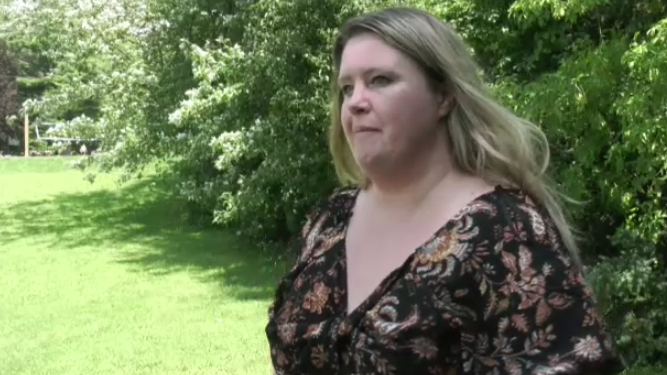'I'm just constantly spinning in circles': Canada’s healthcare crisis hits close to home in Waterloo Region
A new report is highlighting issues(opens in a new tab) within Canada’s healthcare subsystem. It cites staffing shortages and surgical backlogs are among the top issues, and it is hitting close to home.
For Brittany Medcalf, scheduling a medical appointment isn’t easy.
"I've been facing just referrals bouncing back and forth, phone calls not coming back from really a bunch of doctors."
Medcalf says it's nearly impossible to find a new family physician in Waterloo Region, so she's holding on to her doctor from Ottawa.
"I’m just constantly spinning in circles, I’ll call my GP it'll take a week for her to call me back. I’ve had mental health referrals lost when I needed them the most."
Medcalf hopes things will improve.
"I feel like I’ve just completely lost hope in our healthcare system, I do know doing something for our healthcare workers might be a start."
A recent report from the Canadian Institute for Health Information (CIHI) suggests Medcalf isn't alone.
LOCAL HOSPITALS REACT
While 88 per cent of Canadians have regular health providers, others struggle to access care.
"What we're hearing loud and clear is they don't know where to go because if they don't have that community primary physician or walk-in clinic in a certain area, the emergency department becomes unfortunately the back-fall from that," said Lynanne Mason, vice president of partnerships and chief nursing executive with the Huron Perth Healthcare Alliance.
Roughly 743,000 fewer surgeries were performed in Canada during the first 2 1/2 years of the pandemic, with a 15 per cent drop in Ontario alone.
"It mainly impacted our orthopaedic group, so think about those hip and knee replacements,” said Mason. “So, we're decreased to eight months now, so that's kind of a snapshot of what it looks like."
Despite the drop in surgeries, overtime hours in Canada’s public hospitals from 2020 to 2021 increased by 15 per cent.
This is something one public health expert says is an example of the pressure COVID-19 had on healthcare workers.
"You'll have to plan for these kind of supports and changes, and as I said, you need to basically look at what are the gaps in the system and then try to address these gaps," said Zahid Butt, professor of public health at the University of Waterloo.
In response to the increase in surgery backlogs, a spokesperson for St. Mary’s General and Grand River hospitals told CTV News: “Regionally, our hospitals continue to work together to address surgical waitlists and find creative ways to utilize our shared and unique resources. Over the next 20 years, the communities we serve will grow significantly larger and older, adding to the current capacity pressures.”
Cambridge Memorial Hospital says they're back to normal for surgeries and continue to work with surgical staff to address waitlists and backlogs. “We recognize the impact that the pandemic had on our community’s access to surgeries from 2020 to 2022. Throughout the pandemic, we always ensured our highest-priority cancer cases were done. During the pandemic, we also established 2 partnerships with community providers to perform cataracts and endoscopy procedures," the hospital said.
‘IT IS AN ENORMOUS CONCERN’
The Registered Nurses’ Association commends the new report and its effort to address the state of the healthcare system.
“It is an enormous concern to RNAO, nurses and the public that jurisdictions like Alberta and Ontario are choosing to use this huge need for more surgeries as a lever to privatize healthcare services(opens in a new tab) in the province,” said RNAO President Dr. Claudette Holloway.
As noted by CIHI in the report, the number of nurses working in some healthcare settings has decreased – including the number of registered nurses giving direct patient care in hospitals and in long-term care homes.
“Although important steps have been taken by the Ontario government targeted to nurse recruitment, including adding new seats for all categories of nursing students and improving registration processes for internationally educated nurses residing in Ontario; retention strategies must speed up to address the nursing crisis,” explained Holloway.
RNAO is pushing for better data, better electronic health records and online access while emphasizing the need for privacy protections.
Must Watch
Top Videos
CTVNews.ca Top Stories

Canada could impose tariffs on U.S. steel, orange juice in response to Trump threat
Canadian officials are narrowing a list of American products to target in the event the federal government must respond to U.S. tariffs on Canadian goods, CTV News has confirmed.
2 hours ago
Convicted Jan. 6 rioter arrested as fugitive in Whistler, B.C.
An American citizen convicted of participating in the Jan. 6, 2021, riot on Capitol Hill who said he was seeking asylum in Canada has been arrested as a "fugitive from U.S. justice," according to authorities.
1 hour ago
Can the U.S. really make Canada the 51st state?
Talk of Canada becoming the 51st American state has raised an existential question on this side of the border: Could it be done? Could the maple leaf make way to the stars and stripes? According to several experts, it may be possible, but not painless.
4 hours ago
L.A. wildfires continue to devastate area, Canada prepared to offer expertise
A series of wildfires are searing through the Los Angeles area, forcing many to evacuate their homes. Here's everything that happened throughout Jan. 8.
1 hour ago
'True when I said it, true today': former Canadian PM Harper pushes back aganst Trump on social media
Former Canadian Prime Minister Stephen Harper doesn’t find president-elect Donald Trump’s jibes about Canada becoming the 51st U.S. state very amusing.
1 hour ago
Ontario Premier Doug Ford says he is 'OK' after OPP vehicle he was in was 'sideswiped' in Highway 401 collision
Ontario Premier Doug Ford was uninjured after an OPP vehicle he was travelling in was involved in a collision on Highway 401 earlier today.
2 hours ago
At least 60 University of Guelph students sick as 'cluster of illness' hits residence
The University of Guelph is dealing with what they are calling a ‘cluster of illness’ among students living in residence.
Energy minister 'committed' to consumer carbon tax as he considers Liberal leadership
Energy and Natural Resources Minister Jonathan Wilkinson says he would be 'committed' to the consumer carbon tax should he become Liberal leader and prime minister, despite the policy’s unpopularity.
3 hours ago
New ranking suggests Canada passport among 'top 5 losers' in the world
A new global ranking may raise doubts about Canada's reputation of being open to other countries.
3 hours ago

























































